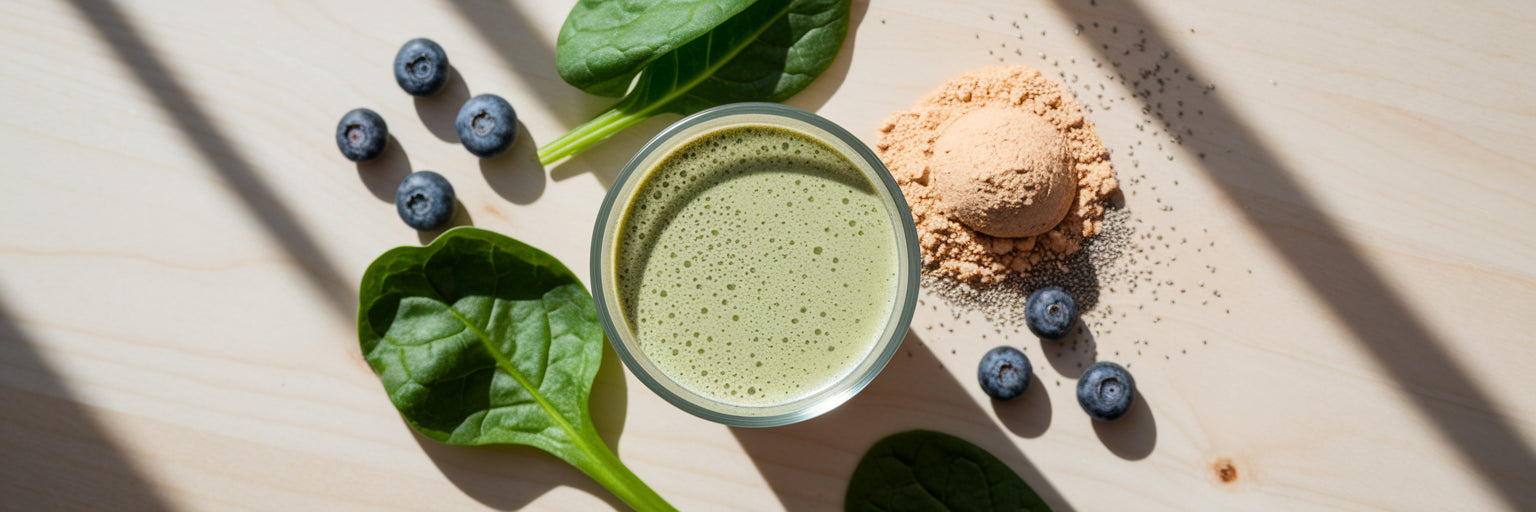You’ve just finished a great workout, you mix up your protein shake, and within an hour, the celebration is over. Instead of feeling strong and replenished, you feel heavy, gassy, and uncomfortably bloated. It’s a frustratingly common experience that makes many people question if protein supplements are even worth it. We can all picture that moment of disappointment when something meant to support our health ends up causing discomfort.
If this sounds familiar, you’re not alone. The good news is that the problem often isn’t the protein itself, but what comes with it. Understanding the common culprits is the first step toward finding a powder that works with your body, not against it.
Why Your Protein Shake Might Be Causing Discomfort
That post-shake discomfort often boils down to a few key ingredients common in many traditional protein powders. Pinpointing these can feel like detective work, but it usually leads back to a handful of usual suspects that don't agree with everyone's digestive system.
For many, the primary issue is dairy. Whey and casein proteins are derived from milk, which means they contain lactose. A significant portion of the population has difficulty digesting lactose, leading to classic symptoms like gas, bloating, and stomach cramps. Even if you don't consider yourself fully lactose intolerant, your gut might still be sensitive enough to react when consuming it in a concentrated form like a protein powder.
Next on the list are artificial sweeteners and sugar alcohols. To keep calories and sugar content low, many brands use ingredients like sucralose, aspartame, or erythritol. While they don't contain sugar, your gut can't always absorb them properly. Instead, they travel to your large intestine where they ferment, a process that produces gas as a byproduct. This fermentation is a frequent cause of that sudden, puffy feeling after you finish your shake.
Finally, take a look at the fillers and gums. Ingredients like xanthan gum or carrageenan are added to create a smooth, thick texture, preventing the powder from feeling gritty. While they improve the drinking experience, these additives can be tough on a sensitive stomach. They absorb water in your gut, which can sometimes lead to digestive distress for certain individuals. When you combine all these potential irritants into one shake, it’s no wonder so many people struggle with discomfort.
The Gut-Friendly Power of Plant Proteins

Now that we’ve identified the common troublemakers, let's talk about the solution. Shifting to a plant-based protein powder isn't just about avoiding the negatives; it's about embracing a whole new set of positives for your digestive wellness. The most immediate benefit is that vegan proteins are naturally lactose-free, instantly eliminating the primary source of discomfort for many people.
But the advantages go much deeper. One of the greatest contributions of plant based protein gut health is fiber. Unlike their dairy-based counterparts, plant sources like peas, rice, and seeds are rich in dietary fiber. This fiber acts as a prebiotic, which is essentially food for the beneficial bacteria living in your gut. Think of it like tending to a garden; by feeding the good microbes, you help them thrive and maintain a healthy, balanced gut microbiome.
When these good bacteria ferment the fiber from plant proteins, they produce something incredibly beneficial: short-chain fatty acids (SCFAs). These compounds are a powerhouse for your digestive system. They serve as the primary energy source for the cells lining your colon, helping to strengthen the gut barrier and reduce inflammation. A stronger gut lining means better nutrient absorption and less irritation, contributing to a feeling of overall well-being.
By choosing a protein source that actively nourishes your gut, you’re doing more than just building muscle. You’re supporting a complex internal ecosystem that impacts everything from your digestion to your mood. Incorporating these powders can be simple and delicious, too. For some creative ideas, you can check out a few of our easy vegan protein recipes that you'll actually crave.
Key Ingredients for a Bloat-Free Experience
Understanding the benefits of plant protein is the first step, but knowing which specific ingredients to look for will help you choose the perfect powder. A high-quality formula is more than just protein; it’s a thoughtful blend of components designed to support digestion. Here are the key players to spot on the label for a truly vegan protein powder no bloating experience.
- Blended Plant Sources: A powder that combines multiple plant proteins, such as pea, brown rice, and pumpkin seed, is often gentler on the stomach. This variety not only provides a complete amino acid profile but also offers a mix of different fibers, which can be easier to digest than a single, highly concentrated source.
- Digestive Enzymes: Look for added digestive enzymes in protein powder, like protease, amylase, and lipase. These are proteins that help your body break down macronutrients more efficiently. Protease, for example, specifically targets protein. By pre-digesting the nutrients, these enzymes reduce the workload on your gut, which can lead to less gas and discomfort. As highlighted by WebMD, certain supplements can aid the body in breaking down food more effectively.
- Probiotics: These are the "good" live bacteria that support a balanced gut microbiome. Strains like Lactobacillus and Bifidobacterium help populate your gut with beneficial microbes that can outcompete the less desirable, gas-producing ones. A healthy microbiome is fundamental to smooth digestion.
- Soothing Botanicals: Ingredients like ginger, peppermint, and turmeric have been used for centuries to calm the digestive system. Ginger is well-known for its ability to soothe nausea, while peppermint can help relax the stomach muscles. Their inclusion in a protein powder adds a natural, gentle touch to support digestive comfort.
Formulations that thoughtfully include these elements, like our Chocolate Vegan Protein, are designed with digestive harmony in mind, making it easier to get your protein without the unwanted side effects.
| Ingredient Type | Primary Function | How It Helps Prevent Bloating |
|---|---|---|
| Blended Plant Proteins | Provides a complete amino acid profile | Offers a diversity of fibers, which is gentler on the stomach than a single concentrated source. |
| Digestive Enzymes (e.g., Protease) | Helps break down proteins and carbs | Reduces the digestive workload on your gut, leading to less gas and discomfort. |
| Probiotics (e.g., Lactobacillus) | Supports a healthy gut microbiome | Populates the gut with 'good' bacteria that can outcompete gas-producing microbes. |
| Soothing Botanicals (e.g., Ginger, Peppermint) | Reduces inflammation and calms the stomach | Naturally soothes the digestive tract and can alleviate feelings of nausea or heaviness. |
Note: This table summarizes key ingredients found in high-quality, digestive-friendly protein powders. The effectiveness can vary based on the specific formulation and individual sensitivity.
What to Avoid on the Ingredient Label

Just as important as knowing what to look for is knowing what to avoid. Becoming a savvy label-reader is your best defense against digestive discomfort. Some ingredients, even in plant-based powders, can still cause trouble. Here are the red flags to watch out for when searching for the best protein powder for sensitive stomachs.
- Excessive Gums and Thickeners: While small amounts of gums like guar or xanthan are generally fine, some powders overdo it. Be particularly wary of carrageenan, a thickener derived from seaweed that some studies have linked to inflammation and gut irritation in sensitive individuals.
- Artificial Sweeteners and Sugar Alcohols: This point is worth repeating. Scan the label for sucralose, aspartame, acesulfame potassium, erythritol, and xylitol. Instead, opt for powders that are unsweetened or naturally sweetened with stevia or monk fruit, which are typically much easier on the gut.
- Vague "Proprietary Blends": If you see a "proprietary blend" on the label without a clear breakdown of what’s inside, it’s a red flag. Transparency is key. You should know exactly what you’re putting into your body and in what amounts. A trustworthy brand will have nothing to hide.
- Common Allergens: "Plant-based" doesn't automatically mean "allergen-free." Many vegan powders use soy or contain gluten. If you have a known sensitivity to either, double-check the label and look for certified gluten-free or soy-free options to be safe.
Making informed choices starts with reading the fine print. Once you know what to look for and what to avoid, finding a powder that works for you becomes much simpler. For a curated list of trusted options, you can explore some of the top choices in our guide to the best protein powders.
Simple Tips for a Happy Gut
Even with the perfect protein powder, your habits can make a big difference in how your body receives it. The final piece of the puzzle is not just *what* you drink, but *how* you drink it. Following a few simple practices can significantly improve your digestive experience and help you figure out how to prevent protein shake bloating for good.
- Start Small: If you're new to vegan protein powders or a particular brand, don't go all-in with a full scoop right away. Start with a half-scoop for a few days. This gives your digestive system time to adapt to the new source of protein and fiber, reducing the chance of any initial discomfort.
- Blend It Well: While a shaker bottle is convenient, a blender is your gut’s best friend. Blending at high speed helps break down the powder and fibers more thoroughly, essentially starting the digestive process for you. A smoother shake is an easier-to-digest shake.
- Sip, Don't Chug: We get it, you're busy. But chugging your protein shake in 30 seconds can overwhelm your digestive system with a large volume of liquid and nutrients all at once. Try to sip it slowly over 10 to 20 minutes. This gives your stomach and enzymes a chance to process it gradually.
- Mind Your Mix-Ins: What you add to your shake matters. Pair your powder with other gut-friendly ingredients like a small banana, a handful of spinach, or a spoonful of chia seeds. However, avoid turning it into a massive meal by adding large amounts of fruit, nut butters, and oats all at once, as this can be too much for your gut to handle in one sitting.
By combining a high-quality powder with mindful consumption habits, you can finally enjoy the benefits of protein supplementation without the bloat. We’d love to hear about your journey! Share your own tips or experiences in the comments below, or explore more health and wellness insights on our blog.



